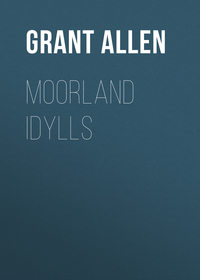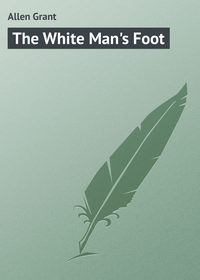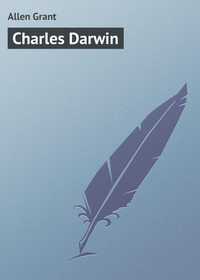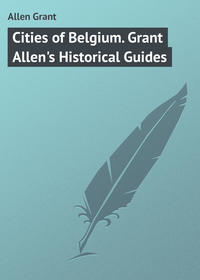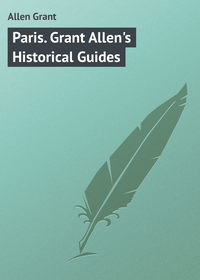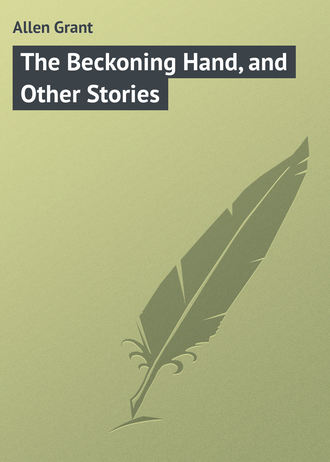 полная версия
полная версияThe Beckoning Hand, and Other Stories
On the other hand, he couldn't bear, either, to display it openly, and thereby become, as the matter envisaged itself to his mind, a direct preacher of evolutionism – that is to say, of irreligion and immorality. With what face could he ever rise and exhibit at a scientific meeting this evident proof that the whole universe was a black chaos, a gross materialistic blunder, a festering mass of blank corruption, without purpose, soul, or informing righteousness? His entire moral being rose up within him in bitter revolt at the bare notion of such cold-blooded treachery. To give a long-winded Latin classificatory name, forsooth, to a thing that would destroy the faith of ages! At last, after long pondering, he determined to carry the slab carefully home inside his coat, and hide it away sedulously for the present in the cupboard of his little physiological laboratory. He would think the matter over, he would take time to consider, he would ask humbly for light and guidance. But of whom? Well, well, at any rate, there was no necessity for precipitate action. To Cyril Milliter's excited fancy, the whole future of human thought and belief seemed bound up inextricably at that moment in the little slab of lithographic slate that lay before him; and he felt that he need be in no hurry to let loose the demon of scepticism and sin (as it appeared to him) into the peaceful midst of a still happily trusting and unsuspecting humanity.
He put his hand into his pocket, casually, to pull out his handkerchief for a covering to the thing, and, as he did so, his fingers happened to touch the familiar clasp of his little pocket Bible. The touch thrilled him strangely, and inspired him at once with a fresh courage. After all, he had the Truth there also, and he couldn't surely be doing wrong in consulting its best and most lasting interests. It was for the sake of the Truth that he meant for the present to conceal his compromising fossil. So he wrapped up the slab as far as he was able in his handkerchief, and hid it away, rather clumsily, under the left side of his coat. It bulged a little, no doubt; but by keeping his arm flat to his side he was able to cover it over decently somehow. Thus he walked back quickly to Mortiscombe, feeling more like a thief with a stolen purse in his pocket than he had ever before felt in the whole course of his earthly existence.
When he reached his own house, he would not ring, lest Netta should run to open the door for him, and throw her arms round him, and feel the horrid thing (how could he show it even to Netta after this morning's sermon?), but he went round to the back door, opened it softly, and glided as quietly as he could into the laboratory. Not show it to Netta – that was bad: he had always hitherto shown her and told her absolutely everything. How about the Truth? He was doing this, he believed, for the Truth's sake; and yet, the very first thing that it imposed upon him was the necessity for an ugly bit of unwonted concealment. Not without many misgivings, but convinced on the whole that he was acting for the best, he locked the slab of oolite up, hurriedly and furtively, in the corner cupboard.
He had hardly got it safely locked up out of sight, and seated himself as carelessly as he could in his easy chair, when Netta knocked softly at the door. She always knocked before entering, by force of habit, for when Cyril was performing delicate experiments it often disturbed him, or spoilt the result, to have the door opened suddenly. Netta had seen him coming, and wondered why he had slunk round by the back door: now she wondered still more why he did not "report himself," as he used to call it, by running to kiss her and announce his return.
"Come in," he said gravely, in answer to the knock; and Netta entered.
Cyril jumped up and kissed her tenderly, but her quick woman's eye saw at once that there was something serious the matter. "You didn't ring, Cyril darling," she said, half reproachfully, "and you didn't come to kiss your wifie."
"No," Cyril answered, trying to look quite at his ease (a thing at which the most innocent man in the world is always the worst possible performer), "I was in a hurry to get back here, as there was something in the way of my work I wanted particularly to see about."
"Why, Cyril," Netta answered in surprise; "your work! It's Sunday."
Cyril blushed crimson. "So it is," he answered hastily; "upon my word, I'd quite forgotten it. Goodness gracious, Netta, shall I have to go down to meeting and preach again to those people this evening?"
"Preach again? Of course you will, Cyril. You always do, dear, don't you?"
Cyril started back with a sigh. "I can't go to-night, Netta darling," he said wearily. "I can't preach to-night. I'm too tired and out of sorts – I'm not at all in the humour for preaching. We must send down somehow or other, and put off the brethren."
Netta looked at him in blank dismay. She felt in her heart there was something wrong, but she wouldn't for worlds ask Cyril what it was, unless he chose to tell her of his own accord. Still, she couldn't help reading in his eyes that there was something the matter: and the more she looked into them, the more poor Cyril winced and blinked and looked the other way in the vain attempt to seem unconcerned at her searching scrutiny. "I'll send Mary down with a little written notice," she said at last, "to fix on the door: 'Mr. Milliter regrets he will be unable, through indisposition, to attend worship at Patmos this evening.' Will that do, Cyril?"
"Yes," he answered uneasily. "That'll do, darling. I don't feel quite well, I'm afraid, somehow, after my unusual exertions this morning."
Netta looked at him hard, but said nothing.
They went into the drawing-room and for a while they both pretended to be reading. Then the maid brought up the little tea-tray, and Cyril was obliged to lay down the book he had been using as a screen for his crimson face, and to look once more straight across the room at Netta.
"Cyril," the little wife began again, as she took over his cup of tea to his easy chair by the bow window, and set it down quietly on the tiny round table beside him, "where did you go this afternoon?"
"On the Downs, darling."
"And whom did you meet there?"
"Nobody, Netta."
"Nobody, Cyril?"
"No, nobody."
Netta knew she could trust his word implicitly, and asked him no further. Still, a dreadful cloud was slowly rising up before her. She felt too much confidence in Cyril to be really jealous of him in any serious way; but her fears, womanlike, took that personal shape in which she fancied somebody or something must be weaning away her husband's love gradually from her. Had he seen some girl at a distance on the Downs, some one of the Mortiscombe ladies, with whom perhaps he had had some little flirtation in the days gone by – some lady whom he thought now would have made him a more suitable, companionable wife than poor little Netta? Had he wandered about alone, saying to himself that he had thrown himself away, and sacrificed his future prospects for a pure, romantic boyish fancy? Had he got tired of her little, simple, homely ways? Had he come back to the house, heartsick and disappointed, and gone by himself into the working laboratory on purpose to avoid her? Why was he so silent? Why did he seem so preoccupied? Why would he not look her straight in the face? Cyril could have done nothing to be ashamed of, that Netta felt quite sure about, but why did he behave as if he was ashamed of himself – as if there was something or other in his mind he couldn't tell her?
Meanwhile, poor Cyril was not less unhappy, though in a very different and more masculine fashion. He wasn't thinking so much of Netta (except when she looked at him so hard and curiously), but of the broken gods of his poor little scientific and theological pantheon. He was passing through a tempest of doubt and hesitation, compelled to conceal it under the calm demeanour of everyday life. That horrid, wicked, system-destroying fossil was never for a moment out of his mind. At times he hated and loathed the godless thing with all the concentrated force of his ardent nature. Ought he to harbour it under the shelter of his hospitable roof? Ought he to give it the deadly chance of bearing its terrible witness before the eyes of an innocent world? Ought he not to get up rather in the dead of night, and burn it to ashes or grind it to powder – a cruel, wicked, deceiving, anti-scriptural fossil that it was? Then again at other times the love of Truth came uppermost once more to chill his fiery indignation. Could the eternal hills lie to him? Could the evidence of his own senses deceive him? Was not the creature there palpably and visibly present, a veritable record of real existence; and ought he not loyally and reverently to accept its evidence, at whatever violence to his own most cherished and sacred convictions? If the universe was in reality quite other than what he had always hitherto thought it; if the doctrines he had first learned and then taught as certain and holy were proved by plain facts to be mere ancient and fading delusions, was it not his bounden duty manfully to resign his life-long day-dream, and to accept the Truth as it now presented itself to him by the infallible evidence of mute nature, that cannot possibly or conceivably lie to us?
The evening wore away slowly, and Cyril and Netta said little to one another, each absorbed in their own thoughts and doubts and perplexities. At last bedtime came, but not much sleep for either. Cyril lay awake, looking out into the darkness which seemed now to involve the whole physical and spiritual world; seeing in fancy a vast chaotic clashing universe, battling and colliding for ever against itself, without one ray of hope, or light, or gladness left in it anywhere. Netta lay awake, too, wondering what could have come over Cyril; and seeing nothing but a darkened world, in which Cyril's love was taken away from her, and all was cold, and dull, and cheerless. Each in imagination had lost the keystone of their own particular special universe.
Throughout the next week, Cyril went on mechanically with his daily work, but struggling all the time against the dreadful doubt that was rising now irresistibly within him. Whenever he came home from college, he went straight to his laboratory, locked the door, and took the skeleton out of the cupboard. It was only a very small skeleton indeed, and a fossil one at that; but if it had been a murdered man, and he the murderer, it could hardly have weighed more terribly than it actually did upon Cyril Milliter's mind and conscience. Yet it somehow fascinated him; and in all his spare time he was working away at the comparative anatomy of his singular specimen. He had no doubts at all about it now: he knew it perfectly for what it was – an intermediate form between birds and reptiles. Meanwhile, he could not dare to talk about it even to Netta; and Netta, though the feeling that there was something wrong somewhere deepened upon her daily, would not say a word upon the subject to Cyril. But she had discovered one thing – that the secret, whatever it was, lay closed up in the laboratory cupboard; and as her fears exaggerated her doubts, she grew afraid at last almost to enter the room which held that terrible, unspeakable mystery.
Thus more than a fortnight passed away, and Cyril and Netta grew daily less and less at home with one another. At last, one evening, when Cyril seemed gloomier and more silent than ever, Netta could bear the suspense no longer. Rising up hastily from her seat, without one word of warning, she went over to her husband with a half-despairing gesture of alarm, and, flinging her arms around him with desperate force, she cried passionately through her blinding tears, "Cyril, Cyril, Cyril, you must tell me all about it."
"About what, darling?" Cyril asked, trembling with half-conscious hypocrisy, for he knew in his heart at once what she meant as well as she did.
"Cyril," she cried again, looking him straight in the face steadily, "you have a secret that you will not tell me."
"Darling," he answered, smoothing her hair tenderly with his hand, "it is no secret. It is nothing. You would think nothing of it if you knew. It's the merest trifle possible. But I can't tell you. I can not tell you."
"But you must, Cyril," Netta cried bitterly. "You had never any secret from me, I know, till that dreadful Sunday, when you went out alone, and wouldn't even let me go with you. Then you came back stealthily by the back door, and never told me. And you brought something with you: of that I'm certain. And you've got the something locked up carefully in the laboratory cupboard. I don't know how I found it all out exactly, but I have found it out, and I can't bear the suspense any longer, and so you must tell me all about it. Oh, Cyril, dear Cyril, do, do tell me all about it!"
Cyril faltered – faltered visibly; but even so, he dare not tell her. His own faith was going too terribly fast already; could he let hers go too, in one dreadful collapse and confusion? It never occurred to him that the fossil would mean little or nothing to poor Netta; he couldn't help thinking of it as though every human being on earth would regard it with the same serious solemnity and awe as he himself did. "I cannot tell you, Netta," he said, very gently but very firmly. "No, I dare not tell you. Some day, perhaps, but not now. I must not tell you."
The answer roused all Netta's worst fears more terribly than ever. For a moment she almost began to doubt Cyril. In her terror and perplexity she was still too proud to ask him further; and she went back from her husband, feeling stung and repulsed by his cruel answer, and made as though she did not care at all for his strange refusal. She took up a scientific paper from the heap on the table, and pretended to begin reading it. Cyril rose and tried to kiss her, but she pushed him away with an impatient gesture. "Never," she said haughtily. "Never, Cyril, until you choose to tell me your private secret."
Cyril sank back gloomily into his chair, folded his hands into one another in a despondent fashion, and looked hard at the vacant ceiling without uttering a single word.
As Netta held the paper aimlessly before her that minute, by the merest chance her eye happened to fall upon her husband's name printed in the article that lay open casually at the middle page. Even at that supreme moment of chagrin and torturing doubt, she could not pass by Cyril's name in print without stopping to read what was said about him. As she did so, she saw that the article began by hostile criticism of the position he had taken up on the distinction between birds and reptiles in a recent paper contributed to the Transactions of the Linnæan Society. She rose from her place silently, put the paper into his hands and pointed to the paragraph with her white forefinger, but never uttered a single syllable. Cyril took it from her mechanically, and read on, not half thinking what he was reading, till he came to a passage which attracted his attention perforce, because it ran somewhat after this fashion —
"Professor Milliter would have written a little less confidently had he been aware that almost while his words were passing through the press a very singular discovery bearing upon this exact subject was being laid before the Academy of Sciences at Berlin. Dr. Hermann von Meyer has just exhibited to that body a slab of lithographic slate from the famous oolitic quarry at Solenhofen, containing the impression of a most remarkable organism, which he has named Archæopteryx lithographica. This extraordinary creature has the feathers of a bird with the tail of a lizard; it is entirely destitute of an os coccygis; it has apparently two conical teeth in the upper jaw; and its foot is that of a characteristic percher." And so forth for more than a column, full of those minute anatomical points which Cyril had himself carefully noticed in the anatomy of his own English specimen.
As he read and re-read that awful paragraph, Netta looking on at him half angrily all the time, he grew more and more certain every moment that the German professor had simultaneously made the very same discovery as himself. He drew a long sigh of relief. The worst was over; the murder was out, then; it was not to be he who should bear the responsibility of publishing to the world the existence and peculiarities of that wicked and hateful fossil. A cold-blooded German geologist had done so already, with no more trace of remorse and punctiliousness in the business than if it had been the merest old oyster-shell or spider or commonplace cockroach! He could hardly keep in his excited feelings; the strain of personal responsibility at least was lightened; and though the universe remained as black as ever, he could at any rate wash his own hands of the horrid creature. Unmanly as it may seem, he burst suddenly into tears, and stepped across the room to throw his arms round Netta's neck. To his surprise – for he scarcely remembered that she could not yet realize the situation – Netta repelled him with both hands stretched angrily before her, palm outwards.
"Netta," he said, imploringly, recognizing immediately what it was she meant, "come with me now into the laboratory, and see what it is that I have got in the cupboard."
Netta, all trembling and wondering, followed him in a perfect flutter of doubt and anxiety. Cyril slowly unlocked the cupboard, then unfastened a small drawer, and last of all took out a long flat object, wrapped up mysteriously in a clean handkerchief. He laid it down reluctantly upon the table, and Netta, amazed and puzzled, beheld a small smooth slab of soft clay-stone, scored with what seemed like the fossil marks of a few insignificant bones and feathers. The little woman drew a long breath.
"Well, Cyril?" she said interrogatively, looking at it in a dubious mood.
"Why, Netta," cried her husband, half angry at her incomprehensible calmness, "don't you see what it is? It's terrible, terrible!"
"A fossil, Cyril, isn't it? A bird, I should say."
"No, not a bird, Netta; nor yet a lizard; but that half-way thing, that intermediate link you read about just now over yonder in the paper."
"But why do you hide it, Cyril? You haven't taken it anywhere from a museum."
"Oh, Netta! Don't you understand? Don't you see the implications? It's a creature, half bird and half reptile, and it proves, absolutely proves, Netta, beyond the faintest possibility of a doubt, that the evolutionists are quite right – quite scientific. And if it once comes to be generally recognized, I don't know, I'm sure, what is ever to become of religion and of science. We shall every one of us have to go and turn evolutionists!"
It is very sad to relate, but poor Netta, her pent-up feelings all let loose by the smallness of the evil, as it seemed to her, actually began to smile, and then to laugh merrily, in the very face of this awful revelation. "Then you haven't really got tired of me, Cyril?" she cried eagerly. "You're not in love with somebody else? You don't regret ever having married me?"
Cyril stared at her in mute surprise. What possible connection could these questions have with the momentous principles bound up implicitly in the nature-printed skeleton of Archæopteryx lithographica? It was a moment or so before he could grasp the association of ideas in her womanly little brain, and understand the real origin of her natural wife-like fears and hesitations.
"Oh, Cyril," she said again, after a minute's pause, looking at the tell-tale fossil with another bright girlish smile, "is it only that? Only that wretched little creature? Oh, darling, I am so happy!" And she threw her arms around his neck of her own accord, and kissed him fervently twice or thrice over.
Cyril was pleased indeed that she had recovered her trust in him so readily, but amazed beyond measure that she could look at that horrible anti-scriptural fossil absolutely without the slightest symptom of flinching. "What a blessed thing it must be," he thought to himself, "to be born a woman! Here's the whole universe going to rack and ruin, physically and spiritually, before her very eyes, and she doesn't care a fig as soon as she's quite satisfied in her own mind that her own particular husband hasn't incomprehensibly fallen in love with one or other of the Mortiscombe ladies!" It was gratifying to his personal feelings, doubtless; but it wasn't at all complimentary, one must admit, to the general constitution of the universe.
"What ought I to do with it, Netta?" he asked her simply, pointing to the fossil; glad to have any companionship, even if so unsympathetic, in his hitherto unspoken doubts and difficulties.
"Do with it? Why, show it to the Geological Society, of course, Cyril. It's the Truth, you know, dearest, and why on earth should you wish to conceal it? The Truth shall make you perfect."
Cyril looked at her with mingled astonishment and admiration. "Oh, Netta," he answered, sighing profoundly, "if only I could take it as quietly as you do! If only I had faith as a grain of mustard-seed! But I have been reduced almost to abject despair by this crushing piece of deadly evidence. It seems to me to proclaim aloud that the evolutionists are all completely right at bottom, and that everything we have ever loved and cherished and hoped for, turns out an utter and absolute delusion."
"Then I should say you were still bound, for all that, to accept the evidence," said Netta quietly. "However, for my part, I may be very stupid and silly, and all that sort of thing, you know, but it doesn't seem to me as if it really mattered twopence either way."
Cyril looked at her again with fresh admiration. That was a point of view that had not yet even occurred to him as within the bounds of possibility. He had gone on repeating over and over again to his congregation and to himself that if evolution were true, religion and morality were mere phantoms, until at last he had ceased to think any other proposition on the subject could be even thinkable. That a man might instantly accept the evidence of his strange fossil, and yet be after all an indifferent honest citizen in spite of it, was an idea that had really never yet presented itself to him. And he blushed now to think that, in spite of all his frequent professions of utter fidelity, Netta had proved herself at last more loyal to the Truth in both aspects than he himself had done. Her simple little womanly faith had never faltered for a moment in either direction.
That night was a very happy one for Netta: it was a somewhat happier one than of late, even for Cyril. He had got rid of the cloud between himself and his wife: he had made at least one person a confidante of his horrid secret: and, above all, he had learnt that some bold and ruthless German geologist had taken off his own shoulders the responsibility of announcing the dreadful discovery.
Still, it was some time before Cyril quite recovered from the gloomy view of things generally into which his chance unearthing of the strange fossil had temporarily thrown him. Two things mainly contributed to this result.
The first was that a few Sundays later he made up his mind he ought in common honesty to exhibit his compromising fossil to the congregation in the upper chamber, and make a public recantation of his recent confident but untenable statements. He did so with much misgiving, impelled by a growing belief that after all he must trust everything implicitly to the Truth. It cost him a pang, too, to go back upon his own deliberate words, so lately spoken; but he faced it out, for the Truth's sake, like an honest man, as he had always tried to be – save for those few days when the wicked little slab of slate lay carefully hidden away in the inmost recesses of the laboratory cupboard. To his immense surprise, once more, the brethren seemed to think little more of it than Netta herself had done. Perhaps they were not so logical or thorough-going as the young professor: perhaps they had more of unquestioning faith: perhaps they had less of solid dogmatic leaven; but in any case they seemed singularly little troubled by the new and startling geological discovery. However, they were all much struck by the professor's honesty of purpose in making a straightforward recantation of his admitted blunder; he had acted honest and honourable, they said, like a man, and they liked him better for it in the end, than if he'd preached, and hedged, and shilly-shallied to them about it for a whole year of Sundays together. Now, the mere fact that his good congregation didn't mind the fossil much reacted healthily on Cyril Milliter, who began to suspect that perhaps after all he had been exaggerating the religious importance of speculative opinions on the precise nature of the cosmogony.



